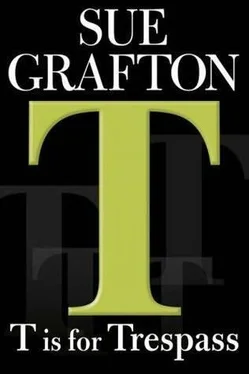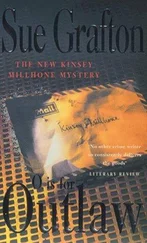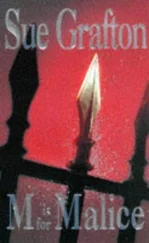I studied the directory in the lobby, which really amounted to little more than a walk-in pantry where you could wait for an elevator that moved with all the speed and grace of a dumbwaiter. The rents here weren’t cheap. The location was prime, though the building itself was woefully out of date. The owner probably couldn’t bear to sacrifice the time, energy, and money required to move tenants out and do a proper remodeling job.
The elevator arrived, a four-by-four cubicle that jerked and shuddered throughout my creeping ascent. This gave me time to examine safety inspection dates and speculate about how many people it would take to exceed the weight limit, which was 2,500 pounds. I figured ten guys at 250 pounds apiece, assuming you could squeeze ten guys into a contraption that size. Twenty women at 125 pounds each was out of the question.
I exited on three. The floor in the corridor was a speckled black-and-white terrazzo marble, rubble in other words, bound with white cement, white sand, and pigment, and reformed as tile. The walls were paneled in oak that was darkened by time. Oversized windows at either end of the hall let in daylight that was augmented by rafts of fluorescent tubing. The entrance doors to the offices were pebbled glass with the names of the occupants stenciled in black. I thought the effect was charming, suggestive as it was of lawyers’ and detectives’ offices in old black-and-white movies.
Altinova’s office was midway down the hall. The door opened into a modest reception area that had been modernized by the addition of a desk made of stainless steel and poured glass. The desktop was bare except for a four-line telephone console. The lighting in the room was indirect. The chairs-four of them-looked as though they’d make your butt go numb minutes after you sat down. There were no side tables, no magazines, no art, and no plants. Certain “interior designers” do shit like this and call it minimalism. What a joke. The place looked like the tenant had yet to move in.
A receptionist came through a door in the back wall marked “private.” She was a tall, cool blonde, too pretty to imagine she wasn’t banging the boss.
“May I help you?”
“I wonder if I might have a quick word with Mr. Altinova.” I thought the word “quick” struck a nice note.
“You have an appointment?”
“Actually, I don’t. I was over at the courthouse and decided I’d chance it. Is he in?”
“Can you tell me what this is regarding?”
“I’d prefer to discuss it with him.”
“Were you referred?”
“No.”
She didn’t like my responses so she punished me by breaking off eye contact. Her face was a perfect oval, as smooth, pale, and unblemished as an egg. “And your name is?”
“Millhone.”
“Pardon?”
“Millhone. M-I-L-L/H-O-N-E. Accent on the first syllable. Some people pronounce it ‘Malone,’ but I don’t.”
“I’ll see if he’s free.”
I was reasonably certain he didn’t know who I was, and if he did know, I was hoping he’d be curious what I was up to. I was curious myself. I knew he wouldn’t give me a snippet of information. Primarily, I wanted to lay eyes on the man who’d drafted the legal papers that eradicated Gus Vronsky’s autonomy. Also, I thought it might be interesting to shake the tree to see if anything ripe or rank hit the ground.
Two minutes later the man himself appeared, holding on to the frame while he stuck his head around the door. Good move on his part. If he’d invited me into his office, he might have given the impression he was interested in what I had to say. His coming out to the reception desk implied that:
(a) he could disappear at will,
(b) that my business wasn’t worth sitting down for, and
(c) therefore I’d better get to the point.
I said, “Mr. Altinova?”
“What can I do for you?” His tone was as flat and hard as the look in his eyes. He was tall and dark-haired with sturdy black-framed glasses resting on a sturdy outcrop of nose. Good teeth, fleshy mouth, and a cleft chin so pronounced it looked as if someone had taken a hatchet to his face. I placed him in his late sixties, but he looked fit and he carried himself with the vigor (or perhaps testiness) of someone younger. The receptionist peered over his shoulder from the hallway, watching our interchange like a kid hoping to see a sibling get bawled out and sent to her room.
“I’m looking for a woman named Cristina Tasinato.”
His expression showed nothing, but he did peer around the door with mock curiosity, scanning the reception area as though Ms. Tasinato might be playing hide-and-seek in the nearly empty room. “Can’t help.”
“Name doesn’t ring a bell?”
“What sort of work do you do, Ms. Millhone?”
“I’m a private investigator. I have some questions for Ms. Tasinato. I was hoping you could put me in touch.”
“You know better than that.”
“But she’s a client of yours, yes?”
“Ask someone else. We have nothing to discuss.”
“Her name appears with yours on a document I saw at the courthouse just now. She was appointed conservator for a man named Gus Vronsky. I’m sure you’ve heard of him.”
“Nice meeting you, Ms. Millhone. You can let yourself out.”
Witty rejoinders in short supply, I said, “I appreciate your time.”
He closed the door abruptly, leaving me on my own. I waited a beat, but his lovely receptionist didn’t reappear. I couldn’t believe she was passing up the opportunity to lord it over me. On the pristine glass desktop, line one on the telephone console lit up-Altinova, no doubt, putting a call in to Cristina Tasinato. The desktop was otherwise bare so I couldn’t even see a way to snoop. I let myself out as instructed and took the stairs down, not willing to risk the elevator, which was little more than a rickety box hanging by a string.
I retrieved my car from the public parking garage, circled the block, and headed up Capillo Hill, in my eternal search for Melvin Downs. Having suffered the indignity of Altinova’s rebuff, I needed the soothing effects of routine work. Where Capillo crossed Palisade, I took a left and continued on Palisade until I saw the campus of Santa Teresa City College coming up on my right. The bench at the bus stop was empty. I cruised down the long hill that curved away from the campus. At the bottom there was a small nest of businesses: minimart, liquor depot, and a cluster of motels. If Melvin Downs did maintenance or custodial work, it was hard to believe he was employed only two days a week. Those were full-time jobs, 7:00 A.M. to 3:00 P.M., or hours along those lines. Besides which, the hill itself was long and steep, which meant he’d have had to trudge up that half mile at the end of his workday. Why do that when there was a bus stop half a block in the other direction, closer to the beach?
Back up the hill I went. This time I drove past the college and down as far as the two strip malls at the intersection of Capillo and Palisade. Here my choices were many and varied. On my left there was a large drugstore and, behind it, an independent market that handled local organic produce and other natural foodstuffs. Perhaps Melvin unloaded crates or bagged groceries, or maybe he’d been hired to keep the aisles swept and mopped. I parked in the drugstore lot and went in. I did a walk-through, scanning each aisle as I passed. There was no sign of him. This was Tuesday and if he still worked in the neighborhood, he’d be finishing up in an hour or two. I went out the front exit.
Still on foot, I crossed the street. Walking the length of the mall to my right, I passed two mom-and-pop restaurants, one serving Mexican fare and one leaning more toward the breakfast and lunch trade. I glanced through the window at a shoe repair shop, cased the laundromat, a jewelry store, and the pet-grooming establishment next door. The last small business was a discount shoe store, trumpeting a GOING-OUT-OF-BUSINESS SALE! EVERYTHING REDUCED 30 TO 40 PERCENT. The store was bereft of customers so even the liquidation sale was a dud. I retraced my steps.
Читать дальше












